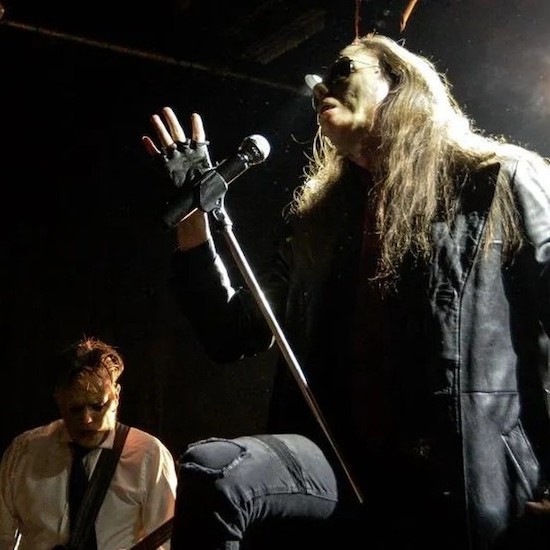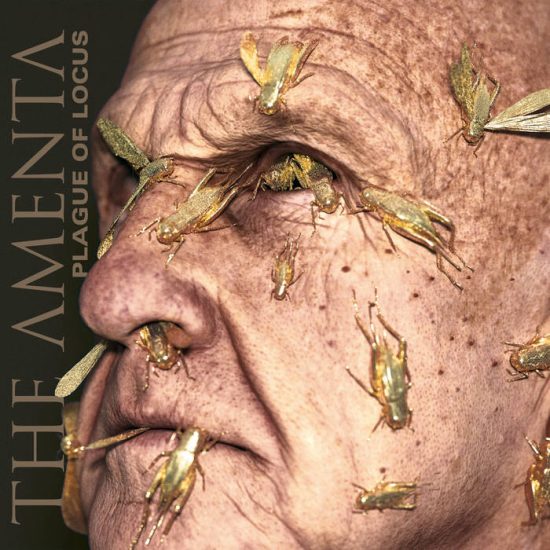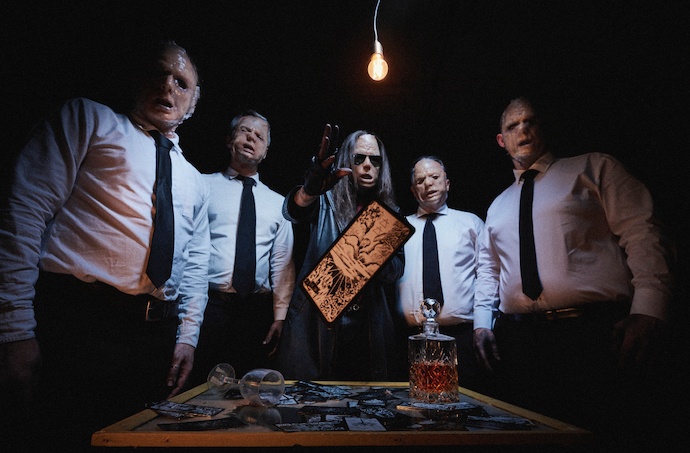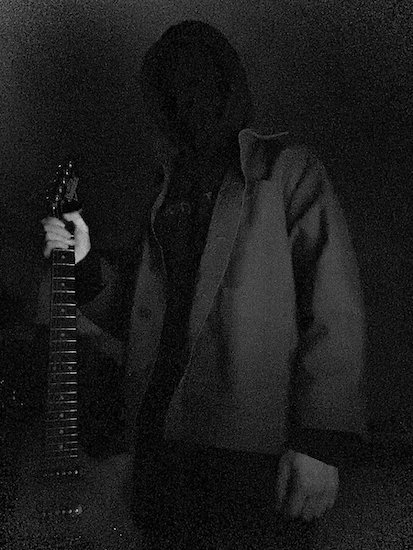
Welcome back, or welcome for the first time. For those who were with me for yesterday’s round-up, I’ll spare you a detailed update on my vaccine-induced congestion and say only that my body’s mucus factory is still vigorously pumping out the product, my wishes be damned.
Like yesterday, I wish I could have made this collection longer. Under the circumstances (which include a rare outing from my hermitage with my spouse this morning), it’s the best I could do. I did attempt to make it a varied experience, with a curveball at the end.
THE AMENTA (Australia)
Well of course we’re leading this column with a new video from The Amenta, because we’re nothing if not slavish in our attention to what they do.
It makes a special kind of sense today because the song that’s the subject of the video is The Amenta‘s cover of Diamanda Galás‘ hymn to Satan, “Sono L’Antichristo“, which originally appeared on her Plague Mass album.

Diamanda‘s original (which you’ll find here) is a chilling ambient excursion, dominated by her demented and demonic vocals (no singing on this one). As my friend and ardent The Amenta admirer DGR remarked, the band “basically turned it into an industrial driven black metal song”.
Aided by the furious blasting and pummeling of Psycroptic drummer David Haley, The Amenta send waves of chords and keys that blare and scythe, searing the senses and distressing the mood, and Cain Cressal’s vicious, flesh-ripping shrieks are equally cauterizing. The Amenta find an intersection of madness and agony, and set it on fire.
I should mention that The Amenta announced they “used AI to create fucked up content which we could splice into our live clips”. They concede that it’s a contentious topic, and it’s one that deserves (and is getting) a whole lot more discussion than I’ve got time to indulge here.
This cover is one of several that appear on The Amenta‘s new EP Plague of Locus, which was released last month by Debemur Morti Productions. The announcement of the video was accompanied by a lengthy statement by The Amenta‘s Timothy Pope, which I’ll leave here:
“DIAMANDA GALÁS is an artist who should need no introduction. Her voice is incomparable to any other and her work is sui generis. ‘Sono L’Antichristo‘ was originally on her incredible “Plague Mass” album which was the first album of hers I had heard. Not long after hearing this album, Erik and I found out that DIAMANDA GALÁS was playing in Sydney at the Opera House. We jumped in the car, desperate to see a live performance of this wild and soul-scouring work, but by the time we got there the show had started and the doors were locked.
On the way to the bar to drown our sorrows, we passed the merch store which proudly displayed GALÁS‘ book “The Shit Of God” (later I found this to be a line from ‘Sono L’Antichristo‘) and we knew we had missed a life-changing performance. Later, at the bar, we would watch scores of well-dressed, well-to-do people, streaming from the exits at intermission, never to return. She had driven them out.
On top of her more “avant-garde” work, DIAMANDA GALÁS is one of the greatest interpreters of classic song and it is in this spirit that she is, in some ways, the patron saint of the whole “Plague Of Locus” release. Our version of the song, and the film clip we now release, can be seen as not only a tribute to an artist who has greatly inspired us over the years, but also a glimpse into what we imagined was happening behind those closed Opera House doors. The fever dreams of two disappointed metalheads.

The video you’ve seen was designed in part to help spread the word about The Amenta‘s impending The Plague of Locus 2023 Tour of Australia. You can find details about that at the band’s Facebook page. Tickets available here. We get no cut from the sales.
https://theamenta1.bandcamp.com/album/plague-of-locus
https://direct-merch.com/products/the-amenta-plague-of-locus-lp
https://direct-merch.com/collections/the-amenta
https://www.facebook.com/theamenta

STILLNESS OF A DYING WORLD (Scotland)
Yesterday I mentioned that my always-daunting task of picking music to highlight in these weekend features was made more daunting by the reappearance of Rennie Resmini‘s starkweather SubStack blog after a hiatus. As usual, lots of his descriptions were alluring, including this one:
Stillness of a Dying World debut with God of the Mind, a black metal assault on sanity daubed in murky production that would align it with primitive acts out there. Although there appears to be more going on under the hood than many intentional lo-fi recorded raw black metal.
For instance, during “Devourer” the bass work has post punk punch and there is a submerged melodic theme (either synth or guitar textures or both) that recall Amebix “Coming Home.” Opening riffs of “The Long War” are almost black metal tremelo takes on classic Bolt Thrower/SacrilegeUK harmonized guitar parts.
You’ll get a sense from Rennie‘s words that the EP is multi-faceted, and so it proves to be. Even though it only includes three songs, they’re longer than average, especially the opening and closing tracks.
You’ll need to be patient at the outset, because “Devourer” takes its time getting started, very gradually building the volume from the dimmest of cold and eerie sounds and ghostly gasps. There’s no sudden eruption, just a seamless and increasingly frightening climb through frost.
The riffing is indeed murky, and the increasingly frantic drums are themselves distant, but the consequences are menacing, and ultimately malicious. Eventually a slowly heaving melody, reminiscent of an organ or an upright bass, makes itself known, adding an element of gothic gloom to the cold acid in the music.
Also seamless is the segue into “The Long War“, which extends the atmosphere of ice-bound gloom and pain, but it also becomes more frantic as the riffing roils, the bass throbs, and the dim drums hammer. The vocals continue to come forth through slow, horrid incantations as the surrounding sounds submerge the listener in unearthly turmoil and travail.
The haunting murkiness of the music is unrelieved in the closing title track, the longest song of the three, but Stillness of a Dying World nevertheless pushes and pulls the intensity in elaborate ways. The riffing (and probably keys) find a balance between unsettling corrosion and eerie gleams; the bass work really seizes attention this time, especially when the music spins like a levitating dervish; a brittle and dismal guitar instrumental is left alone for a time; and the drumming, though primitive, is unpredictable.
This final song also creates an atmosphere of chilling, not-of-this-world grandeur as well as deranged ecstasy, but also, near the end, of a collapse into horror and hopelessness.
I don’t expect this EP will have broad appeal. As Rennie noted, its production quality is too defiantly lo-fi, but as he also noted, some interesting (and very scary) things are happening under the hood, and as you get used to the murk (if you do), they begin to become more evident.
God of the Mind was released in September 2023.
https://stillnessofadyingworld.bandcamp.com/album/god-of-the-mind

EXCOMMUNICATIO (Germany)
Just two days ago Vendetta Records released my next selection in today’s column, an album named Kodex Luzifer, which is the first recording to surface from this Bavarian project. It’s a substantial work, nearly an hour long.
Opened by a scene-setting intro track made of ambient noises, pinging keyboard notes, and misty synths, it then moves into “Morass – The Summoning“, which, in a nutshell, is vastly more frightening. The drums boom like megaton bombs dropping and boulders rumbling; the melodies dismally quiver and chime, as if emerging from an interdimensional veil that’s been parted; bestial snarls and possessed cries have been uncaged from that frightening place as well.
Only in the third song, “Moloch – Sulphur Aeons“, does Excommunicatio finally unleash hell — drums blasting and hammering, the riffing flowing in extravagant harmonized waves, the vocals erupting in wild cries. But the music also becomes more feral and lusting as the drums bounce and those ugly growls take over.
Delirium reigns as well, and the tremolo’d leads also seem like yearning, like pleading for some reprieve, though those horrid voices show no mercy. Backed by a marching stomp, the elaborately layered guitars also ascend in (sulfurous) glory, and then jitter in vicious fevers.
That third track is a fine example of the kinds of variations Excommunicatio works into its songwriting, and the changes keep coming within the following six tracks, so much so that there’s no real temptation to break away despite the album’s length.
To be sure, the album is relentlessly hellish, just as the vocals are relentlessly spine-tingling in their demonic intensity, but the album takes us on a tour — because this vision of hell is not all one place. As rendered in these songs, it is ruled by magisterial haughtiness and cold cruelty, but the lords also exult in their un-ruled excesses and their displays of burning glory, and they war on heaven too. In this infernal pageant we also tour ghettos of suffering and the wandering of lost souls in desolation.
Also to be found are renditions of alabaster beauty, including the piano melody that provides the ending of “Gallows – Rosary to Rope“, the sprightly but melancholy acoustic guitar melody in “Requiem“, and the shimmering synth entrancement at the conclusion of “Ossarium – Lies” that then flows into the mesmerizing ambient album finale, “Low Lying Fog“, as well as unexpected aural oddities at the end of many tracks.
I suppose even in Hell there may be places of beauty and repose, or maybe in these episodes we’ve been allowed to wander beyond its gates.
To adopt more prosaic verbiage, I should add that the album is home to some killer riffs and piercing melodies that get their hooks in, and it provides fuel for reflexive heavy-metal headbanging as well (e.g., within the stunning variations of “Oskorei – Aeon of Rust“). And to underscore one earlier point: these are among the most diabolically possessed and bestial vocals I’ve heard all year — which is one reason you won’t see the reverent choral vocals coming in “Pyres“.
Well, how to succinctly sum up this remarkably ambitious and multi-faceted album? Hell if I know. I guess maybe I just did.
P.S. My use of a tour through Hell is my own metaphor. Here is how the band describes the inspiration for the music:
EXCOMMUNICATIO expresses our way of Natural aversion
against all forms of religious allegiance.
There is no sympathy towards their leaders or their followers.
This is against the hypocrites,
against the slaves of mammon,
against the gods from the machines.
There is nothing but disgust toward the shep≥herds and the sheep.
There are no laws of god,
ther are no laws of man.
There is only nature`s law.
https://vendetta-records.bandcamp.com/album/kodex-luzifer

DELETRIX (Romania)
Now for the promised curveball. Not black metal, but I think still in keeping with the spirit.
Deletrix is the experimental side project of Romanian keyboardist Delia Marinescu. Among other endeavors, she is also the keyboardist in a new project from Daniel Neagoe (Clouds, Eye of Solitude) called Drown the Sea (check out the first single from their forthcoming debut album here), and it was he who introduced me to Deletrix.
Deletrix‘ YouTube channel (here) has quite a lot of content available, but I picked just two songs as an introduction.
The first one, “Shelter Me From the Sun“, deploys swelling orchestral synths to create an atmosphere of haunting and harrowing darkness, providing the backdrop for a piano performance that’s even more distressing in its renditions of loneliness and sorrow.
As winter descends and leaves die, and thoughts turn to things we’ve lost, this is a fine soundtrack.
The second piece I picked is “I’ll have your nightmares for you“. Deletrix introduces it with these words:
With the sound and visuals of this song I want to encourage you all to take a moment and observe all the beauty around you – it can be seen in so many forms, such as nature or human experiences like love, friendship, joy, peace and kindness. Despite all the struggles we experience in our everyday lives there are still so many things that bring beauty and light into the world so don’t let them pass by you unnoticed.
The music is indeed beautiful, but as you might guess from the title of the piece, it too is haunting as well as uplifting. The classically influenced piano melody ethereally rings, and becomes increasingly seductive as it moves through variations.
When Deletrix brings in the orchestration after having woven that spell, it causes the heart to swell — though the jarring clang of left-hand notes gives the song a very unsettling finale.
https://linktr.ee/deletrix
https://www.facebook.com/profile.php?id=100088244345329
